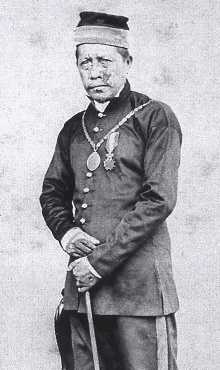Sultanate of Sambas
| Sambas Sultanate | |||||
| Kesultanan Sambas | |||||
| |||||
| Capital | Pontianak | ||||
| Languages | Malay language | ||||
| Religion | Shafi'i Sunni Islam | ||||
| Government | Islamic Absolute Monarchy | ||||
| History | |||||
| - | Established | 1609 | |||
| - | Disestablished | 1956 | |||
Sambas was a traditional Malay state in Indonesia in modern Borneo.
History
At first governed by governors, Sambas became kingdom in 1609 with the descendant of Sepudak. She married one of her daughters to a descendant of the Sultan of Brunei. The child of this union, Muhammad Saif ud-din I became the first Muslim Sultan.
Sambas remained independent until the reign of the Dutch East India Company, when the capital was bombarded in 1812. The Dutch took their interest since 1819, leading finally into frequent minglings into succession and even the deposition and exiling to Java of Abu Bakar Taj ud-din II.

The state was stable, having strong, long-ruling leaders, up until the Japanese conquest of 1942, when Sultan Muhammad Ibrahim Shafi ud-din II was executed in the Pontianak Incident at Mandor in 1944. The Sultanate was thereafter suspended and replaced by a Japanese council, but restored with the return of the Dutch in 1946. They installed another Sultan, who died in 1956. Another monarch did not assume the throne.
From 1984, the head of the Royal House was Winata Kusuma of Sambas, who was recognised as Sultan in 2000 and installed in July 2001. He died in 2008.
The Sultan
The title of the Sultan is "His Highness" and his royal name consists of Sri Paduka al-Sultan Tuanku, then followed by his personal reign name, ibni al-Marhum and concludes with his father's reigning titles and his name.
The wife of the Sultan is titled Sri Paduka Ratu .
The Sultanate follows male primogeniture, with the sons of royal wives having precedence over those of common wives.
List of Rulers
Panembahan Ratu (King) of Sambas:
- Timbang Paseban (1600–1609)
- Sepudak (1609–1632)
- Anom Kesumayuda (1632–1670)
Sultanate of Sambas:
- Muhammad Shafi ud-din I (1675–1685)
- Muhammad Taj ud-din I (1685–1708)
- Umar Aqam ud-din I (1708–1732)
- Abu Bakar Kamal ud-din I (1732–1764)
- Umar Akam ud-din II (1764–1786)
- Achmad Taj ud-din II (1786–1793)
- Abu Bakar Taj ud-din I (1793–1815)
- Muhammad 'Ali Shafi ud-din I (1815–1828)
- Usman Kamal ud-din (1828–1832)
- Umar Akam ud-din III (1832–1846)
- Abu Bakar Taj ud-din II (1846–1854)
- Umar Kamal ud-din (1854–1866)
- Muhammad Shafi ud-din II (1866–1924)
- Muhammad 'Ali Shafi ud-din II (1924–1926)
- Muhammad Tayeb (Chief of Dewan Majelis Kesultanan Sambas 1926 - 1931)
- Muhammad Ibrahim Shafi ud-din (1931–1944)
- Japanese ruling council (1944–1945)
- Muchsin Panji Anom (Chief of Dewan Majelis Kesultanan Sambas 1946 - 1950)
- Muhammad Taufik (Head of the Royal Family 1950 - 1984)
- Winata Kusuma (Head of the Royal Family 1984 - 2000, Sultan 2000 - 2008, died February 1, 2008)
- Muhammad Tarhan (Head of the Royal Family since February 3, 2008)